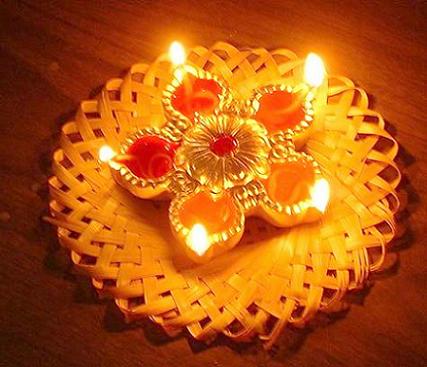October 26, 2011
November 5, 2010
October 17, 2009
October 28, 2008
“Since the light of intelligence (Varhamana Mahavira) is gone,
let us make an illumination of the material matter.”
On the darkest evening in the month of Ashvin (October/November), Hindus around the world fill the night with candles, lamps and firecrackers to celebrate the Festival of Lights known as Diwali.
Diwali, or Deepavali, means literally, a row of lamps. Deep meaning lamp or light, avali meaning array.)
These lights are ubiquitous during Diwali, symbolizing the victory of Inner Light over Darkness.
The third and most auspicious day of the five-day celebration falls on the new moon of the month of Ashvin.

The legends that different regions cite as the origin of Diwali are too various to recount them all.
In the north of India, Hindus celebrate Diwali as the return of the ancient King Rama to his home in Ayodhya after 14 years in exile. The Prince Rama had been forced into exile by his stepmother, Queen Keykayee, who wanted her own son to inherit the throne.
In exile, Rama’s wife Sita was abducted by the ten-headed demon Ravana, who took her back to his kingdom in Sri Lanka. Rama built a bridge from the tip of India to Sri Lanka, slayed Ravana, and returned with his wife to their homeland. The people of Ayodhya were so anxious for his return, lamps were lit all across the nation to welcome him home.
In the South, Hindus recall the defeat of the powerful Narakasura by Lord Krishna and his wife Sathyabhama, as recorded in the Puranas.
Diwali is associated with the rice harvest. One of the most popular Diwali treats is a pounded semi-cooked rice dish known as Poha.
The second and third days are traditional times to invoke the goddess Lakshmi, Vishnu’s consort and the goddess of light, beauty, and prosperity. Women sweep and clean the house to allow Lakshmi a clear path of access. One staple of Diwali is the lighting of firecrackers, but Hindus are careful not to do so during aarti, (ie. invoking the goddess). For Lakshmi prefers tranquility and peace, so a small bell works better than the a loud clap preferred by other gods.

Diwali is considered the New Year and one of the holiest days in the Jain religion. It’s known as Maharvira Nirvana, in honor of the moment the great Mahavira reached Nirvana at age 71.
Celebrants take ritual oil-baths during the festival, symbolic of the cleansing of the soul, in the hopes of a prosperous new year.
“…On this day of Dipavali we worship the Supreme God who is the source of all conceivable virtues, goodness and prosperity, which is symbolised in illumination, lighting and worship in the form of Arati and gay joyous attitude and feeling in every respect.”
Swami Krishnananda
